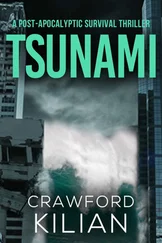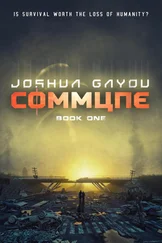“No,” said Samantha.
“He’s, uh, the reason we got out of Oregon,” Otis said. “We wouldn’t have made it if it wasn’t for him. He saved us.”
“Oh… oh,” I said. I felt as though the wind had been knocked out of me. I thought back to when we last saw them and realized only a few months had passed; maybe four or five at the most.
“Seems like you’ve picked up some more people,” Otis said, looking past me to the cabin. I followed his gaze and saw some of them coming out from cover; Oscar and Fred, Tom stepping off the front porch, Monica leading Rebecca, Jeff, and Edgar out of the garage. “Where’s Jake? Billy?”
The sound of Billy’s name was a second shot to my ribs. I took a few moments to regain my composure and said, “Come on, Otis. We all have some things to talk about.”

Jake and Gibs returned an hour later, well after I’d gotten our old friends settled in and somewhat fed. The grownups were sharing a bottle of wine while the kids all had some Kool-aid that was actually cool (as in, it had been left out overnight and then placed in the shade to keep it as cool as possible; we always tried to have a pitcher on hand for the kids if the mix was available). We had this sort-of community bonfire that we ran, not every night but close enough, which was really just an old oil drum stood up on its side about two hundred feet away from the cabin, smack in the middle of everything. We’d throw some scrap wood into it at dusk (there was a lot of scrap lumber left over from Oscar’s various projects most times) as well as the day’s trash, and light it all up just as the last light of the day was failing. We had all kinds of camping chairs and the like circling the drum, close in enough to feel the heat but not so close that we were breathing down a lungful of smoke; and this was how we typically closed out our days after the evening meal. We would chat, tell stories, make plans, sometimes tell jokes or sometimes cry. It was a good place to meet and end your day. Everyone spent most of their days scurrying around chasing after their individual or group projects—there was always another project to work on, always another problem that wanted to be solved—but the fire brought us all together to reconnect, always.
There was no fire running yet as there was still some daylight left. We all sat around it in our chairs in anticipation of the first spark, everyone agreeing silently that the drum would be set alight after Jake and Gibs returned. Otis wanted to know what had happened to Billy right away, so I told him about the night Howard had come calling with his people, how incredibly screwed up it had all gotten, and I made it a point to emphasize how hard Howard had tried to bring the situation to a peaceful resolution before he’d been killed by one of his own group. That part seemed intensely important to me. I described how Billy had gone down shooting and what Jake and I had to do in order to finish the job.
I hesitate to mention something here because I’d spent so much of my life being told that such things don’t matter, especially in the world as it is now, and yet if I ignore it I’m probably being dishonest; with myself and anyone who reads this. Otis, Fred, and Monica all hit it off immediately as though they’d been friends for years. They were different with each other; their voices became more energetic, and they were quicker to laugh than I had been used to. No matter how you might struggle to ignore or disregard such a thing, their shared heritage and experiences growing up in America created a kind of common footing between them; they seemed to fold themselves up in it like it was armor, and they appeared stronger and more vibrant because of it. I recalled that same experience in my own lifetime; dancing at a quinceaňera for any one of my seemingly hundreds of cousins; sitting around a table piled high with masa making tamales with my father and uncles; walking to school with my sister, who I can still barely bring myself to recall or name. Otis, Fred, and Monica laughed together, squeezed each other’s arms, and commiserated; allowed the rest of us to be included within their family, pulled us in with their soft smiles and loud voices. And I felt a homesickness that nearly doubled me over from shock of heartbreak. It seemed to me that the stance our society had tried to adopt for the last generation, that skin color doesn’t matter, was all wrong. Strip away society, burn it to the ground, and you’ll absolutely see how much it does matter. There was a lot of hate being pushed by a lot of different groups towards the end of the world, all of whom were pushing for their own selfish reasons, and underneath it all as a backdrop were row on row of militant youth shouting that race doesn’t matter, sexuality doesn’t matter, religion doesn’t matter, and so on. It all seemed so clear to me sitting around that oil drum, listening to people talk; it mattered so much. What those young, angry kids all missed was that it matters in the right way. All those things that make us different from each other; those are the best things. And all you had to do to get it was to sit down with some friends and tell stories.
“So, let me meet all these new folks you have here with you,” Otis said before I could ask him about his own doings over the past few months (I felt he was holding off on telling that story until Jake returned so he wouldn’t have to tell it twice). “How did everyone here get together?”
“Actually,” Edgar said, “the relationship came about rather organically. I believe we all realized that we could benefit each other and so fell in together naturally.”
“That’s one way to say it,” Wang nodded. “Another way to say it would be that Jake appeared out of nowhere when we were on the verge of starving, took us in, and fed us.”
Otis’ laughter erupted from deep within his chest. “Yeah, that sounds like Jake, alright.” He looked at Edgar, apparently noticed a sour look on his face, and reached a hand out to him, even though they were separated by a distance of some twenty feet on opposite ends of the circle, and said, “Don’t take it so hard. He did the same for us once upon a time.” He reached back with his left hand and lightly patted the Bushmaster hanging from the back of his chair by its sling; a present from a hundred years ago.
“Well, let’s see,” George said, “You’ve gotten a few of our names, but maybe it makes sense if we share our professions as well—”
“Professions?” Otis said, sounding a little surprised.
“That’s right,” agreed George. “Everyone has a skill set.”
“It’s basically our plan to not die,” Wang said. “There’re too many things we have to accomplish in order to get self-sufficient here in the valley for everyone to just be doing whatever they feel like. We have to specialize in certain trades if we’re going to have any chance of surviving.”
“Hey, bro, you think maybe you could say certain things a little differently?” Oscar said, jerking his head slightly in the direction of his daughter.
“Crap. Sorry, Oscar.”
“Wang is blunt, but he’s basically got it right,” George continued. “There’s a lot to do, a lot of us have certain skillsets that transfer well into this environment, so we use them to advance the group’s aims, even if that skill is only tangentially useful. For example, I was a history teacher until I retired. Outside of some odd handyman experience I picked up maintaining my own home and the stunning ability to balance a checkbook and pay bills, that’s about what I have. I know about stuff that happened a long time ago, and I’m good at telling other people about it.”
Читать дальше













